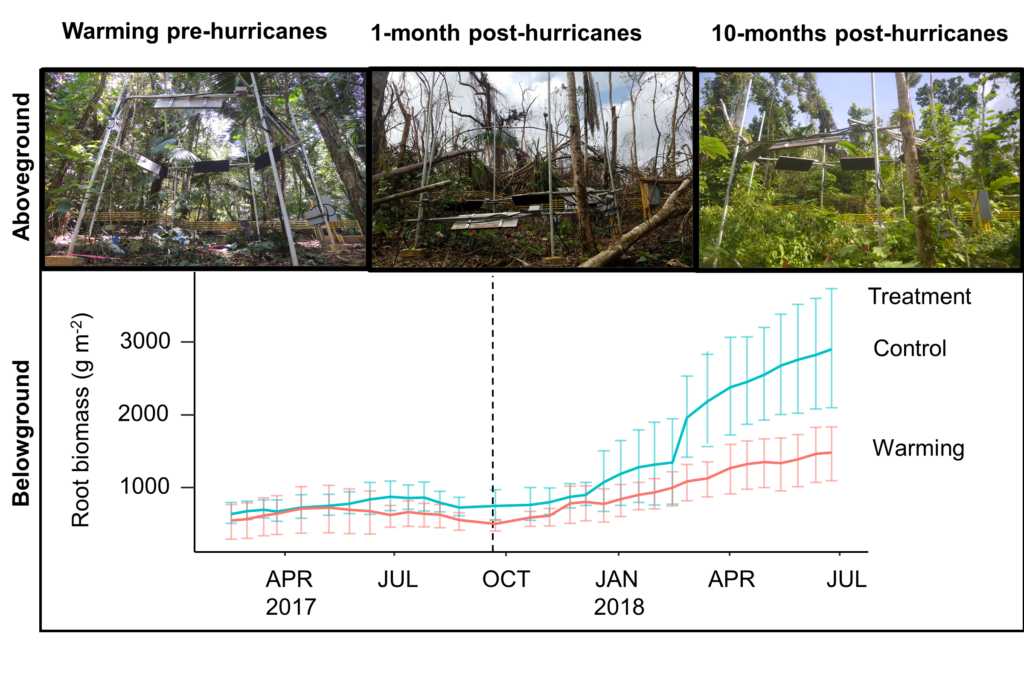Root responses to warming and hurricanes
The Science
This study measured root responses to an increase in soil temperature and two hurricane disturbances. We used root images to measure root production, mortality, and biomass. We also measured aboveground and soil variables to test how these responses changed with environmental variables. We found that root production and biomass decreased with warming. Further, root recovery after the hurricanes was slower in warmed plots compared to controls.
The Impact
Tropical forests are expected to be greatly affected by global warming in the next 20 years. However, it is not known how these forests will respond to this climatic change. Specifically, plant root responses to warming are not well represented in the literature. Our study provided for the first-time measurements on root responses to warming and two hurricanes in a tropical forest. Our results suggest that a decrease in root production in a warmer world and slower root recovery after a hurricane disturbance might have longer term consequences on these forests.
Summary
In hurricane-adapted forests of Puerto Rico, recovery from disturbance is critical to ecosystem function. However, human-caused temperature increases could alter recovery processes. We evaluated forest root dynamics responses to experimental warming as two consecutive hurricanes passed through the island. Although warming was halted, root measurements continued, creating a unique opportunity to evaluate legacy effects of warming on forest recovery following hurricanes. Warming prior to the hurricane disturbance suppressed root production. After the hurricanes, root standing stocks increased overall due to a change in plant composition. This increase was less in previously warmed plots suggesting that antecedent warming conditions suppressed roots’ capacity to recover following hurricane disturbance. Our results suggest tropical forest responses to disturbance may be dramatically changed as Earth warms.

Contacts (BER PM)
BER Program Manager: Daniel Stover; U.S. Department of Energy Office of Science, Office of Biological and Environmental Research, Earth and Environmental Systems Sciences Division (SC-33.1); daniel.stover@science.doe.gov
Brian Benscoter; U.S. Department of Energy Office of Science, Office of Biological and Environmental Research, Earth and Environmental Systems Sciences Division (SC-33.1); brian.benscoter@science.doe.gov
Principal Investigator: Daniela Yaffar, Functional Forest Ecology, University of Hamburg, danielayaffar@uni-hamburg.de
Anthony Walker, Environmental Sciences Division and Climate Change Science Institute, Oak Ridge National Laboratory, walkerap@ornl.gov
Funding
This research was supported as part of the Next Generation Ecosystem Experiments‐Tropics, funded by the U.S. Department of Energy, Office of Science, Office of Biological and Environmental Research.
Publications
Yaffar D, Wood, TE, Reed SC, Branoff BL, Cavaleri MA. and Norby RJ. 2021. Experimental warming and its legacy effects on root dynamics following two hurricane disturbances in a wet tropical forest. Global Change Biology. https://doi.org/10.1111/gcb.15870
Yaffar, D. 2021. Root responses to warming and hurricane disturbances in a wet tropical forest of Puerto Rico: R code and data. https://doi.org/10.15486/ngt/1582598